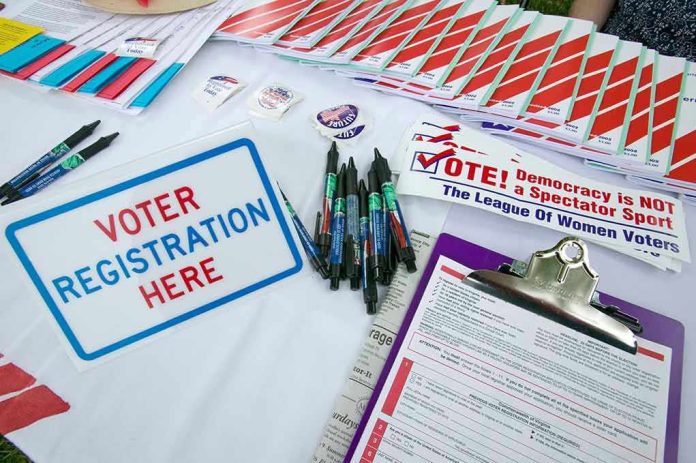
Over 20,000 names vanished from Pennsylvania’s voter rolls after a grassroots army of citizen volunteers did what state officials and highly paid bureaucrats couldn’t—or wouldn’t—do for years, and the political establishment is scrambling to spin the story as anything but a win for common sense and election integrity.
At a Glance
- Citizen volunteers used data and letters to prompt more than 20,000 out-of-state voters to finally cancel their Pennsylvania registrations.
- The resulting purge marked a 500% increase in annual removals and exposed years of government inaction.
- Election integrity advocates call it a model; left-leaning groups stoke fear about “purges” and “disenfranchisement.”
- The fight over who controls the voter rolls—citizens or bureaucrats—just got a lot more heated heading into 2026.
Citizen Volunteers Succeed Where Bureaucrats Stalled
For years, Pennsylvania’s voter rolls read like a travel agency guestbook—packed with people who had long since packed up and left the Keystone State behind. State law requires voters to actively cancel their registration when they move, but most never knew they had to. So, deadwood piled up, and the state’s Department of State yawned its way through “maintenance” while politicians and election officials shrugged off the problem as too big, too complicated, or simply not a priority. Enter the Election Research Institute (ERI) and a battalion of fed-up citizen volunteers, armed not with government funding or a partisan agenda, but with public data, common sense, and a stack of envelopes.
ERI’s analysis found more than 200,000 Pennsylvanians who’d filed permanent change-of-address forms with the Postal Service but were still listed as “active” voters back home. Using ERI’s template, volunteers mailed out thousands of letters, politely informing recipients that they needed to fill out a simple form to cancel their outdated Pennsylvania registration. The result? A tidal wave of responses. Over 20,000 people filed the cancellation paperwork—a more-than-fivefold increase over the previous five-year average. This wasn’t some shadowy purge orchestrated by a political machine; it was ordinary citizens cleaning up a mess the state ignored.
Election Integrity or “Voter Suppression” Hysteria?
As soon as the numbers came in, the usual suspects began their chorus. Election integrity advocates called it a victory for transparency and common sense—proof that regular citizens can out-hustle the bureaucracy and secure the foundation of our elections. But left-leaning advocacy groups, apparently allergic to anything that smells like accountability or citizenship, immediately started hyperventilating about “voter purges” and “disenfranchisement.” Never mind that these were people who had moved out of state and responded voluntarily. According to the perpetual outrage machine, any effort to keep voter rolls accurate—especially if it’s not run by a blue ribbon commission or a six-figure consultant—must be a plot to “suppress” the vote.
Meanwhile, Pennsylvania’s Department of State, caught flat-footed by the success of the campaign, confirmed the historic spike in removals and tried to reassure everyone that “no eligible voters were harmed in the making of this purge.” The real scandal, of course, is that it took a small army of volunteers to do what the state, with all its resources, should have done years ago.
A Model for the Nation—or a Warning Shot?
The impact of this campaign is already rippling beyond Pennsylvania. Election officials in other states, as well as grassroots groups and policy hawks, are watching closely. Some see a new model for citizen-led accountability, with volunteers doing the gritty work of keeping America’s elections honest. Others, especially those who profit from bloated voter rolls and administrative chaos, are clutching their pearls and warning of “partisan overreach.”
The broader context is hardly reassuring for those who care about election integrity. Nationally, the debate over voter roll maintenance is colliding with efforts to require stricter proof of citizenship for registration (the SAVE Act) and high-profile litigation over so-called “aggressive” purges. The usual playbook is in effect: If you demand accuracy, you’re “anti-democracy.” If you want to keep rolls full of people who moved to Florida five years ago, you’re a “defender of rights.” It’s a circus, and it’s only getting louder as the next election approaches.
Bureaucratic Inertia or Citizen Action—Pick a Side
What’s really at stake here is who runs our elections: career bureaucrats and activist judges, or the citizens whose votes actually count. The Pennsylvania campaign proves that ordinary Americans—armed with data, a little elbow grease, and a lot of frustration—can do what the government refuses to. That’s a threat to the political class and their army of consultants, lawyers, and professional “advocates.” But it’s also a reminder that the real power in our republic still rests with the people—if they’re willing to use it.
As policy fights and lawsuits rage in Washington, and as “Project 2025” and the SAVE Act loom large, one thing is clear: the battle over America’s voter rolls is far from over. But for once, the side of common sense and constitutional values just scored a big, undeniable win. Maybe, just maybe, we’ll see more citizen action and less bureaucratic foot-dragging in the years ahead. That’s not just a headline—that’s hope.




